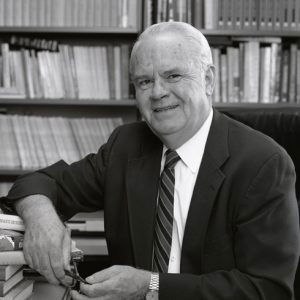calsfoundation@cals.org
University of Arkansas Press (UA Press)
Established in May 1980, the University of Arkansas Press (UA Press) serves as the publishing house of the University of Arkansas (UA) in Fayetteville (Washington County) for scholars in history, sciences, and creative writing. Over the years, the press has garnered a reputation for publishing the poetry of former U.S. poet laureate Billy Collins, as well as several books by former president Jimmy Carter.
In December 1980, in an effort to provide a venue for scholars to publish their work, the press formally opened its doors at the renovated McIlroy House on the edge of campus; a stylized depiction of this house became the press’s logo. Founded by renowned Arkansas poet Miller Williams, along with noted historian and former UA chancellor Willard Gatewood, the press initially lacked the staff and funding to produce its own works. Therefore, Williams worked out an arrangement with his friend William King—head of the University of Missouri Press—by which Missouri would serve as the editing and production house. By 1983, UA Press had developed its own staff and begun to function independently.
In June 1981, UA Press released its first title, The Governors of Arkansas: Essays in Political Biography, edited by Gatewood and fellow historian (and former chair of the UA Department of History) Timothy Donovan; it remains in print today. In that same year, the press released Ellen Gilchrist’s short story collection, The Land of Dreamy Dreams, which sold over 10,000 copies in its first ten months and garnered widespread critical acclaim. In July 1982, Stephanie Brown was named the press’s first editor, with Williams handling most the acquisition of new manuscripts. A November 1983 fire badly damaged the McIlroy House, forcing the staff into temporary quarters. However, within a year, the press reopened there and continued expanding into new publishing avenues.
In February 1984, UA Press established a student writing award for talented young authors and, in 1986, opened an office in London to promote its titles in Europe and West Africa. Two years later, it established a journals department, which produced several scholarly publications, including Philosophical Topics, Journal of Disability Policy Studies, and Arkansas Law Notes.
Another temporary setback occurred in September 1987, when fire damaged the press’s warehouse, destroying a large number of books in the process. Despite this, the press published a number of imprint titles in the following years, including the novel Stoner by John Williams in 1988. In 1989, UA Press released Richard Smith’s The Electronic Atlas of Arkansas, the first computer-based state atlas in the country. In its growing catalogue of books, perhaps the most widely distributed was June Four: A Chronicle of the Chinese Democratic Uprising. The book was acquired, translated, and edited in just two months and was met with wide critical praise. Poet John Ciardi’s Ciardi Himself: Fifteen Essays in the Reading, Writing, and Teaching of Poetry became UA Press’s 100th release in October 1989.
By the 1990s, UA Press had established itself as one of the leading publishing houses for American poets. Along with posthumous works by Fayetteville poet Frank Stanford, the press released several books of award-winning poetry, including Leon Stokesbury’s 1996 Autumn Rhythm: New and Selected Poems, and Robert Mezey’s Collected Poems, 1952–1999. In these same years, former president Jimmy Carter became a mainstay on the press’s roster of authors as a result of his personal friendship with Miller Williams. The press afforded Carter an opportunity to write on a wide array of topics, as evidenced by his 1988 release An Outdoor Journal: Adventures and Reflections, as well as his re-examination of the 1980 Camp David Peace Accords, The Blood of Abraham: Insights into the Middle East, which was first reissued by the press in 1993.
With the arrival of Chancellor John White in 1997, UA Press faced its most daunting challenge to date, as White, on the advice of university administrators, decided to close the press, citing its long-standing fiscal insolvency. In response, Gatewood and a number of other prominent Arkansans launched a public campaign to keep its doors open. In 1998, White relented, admitting that the plan to shutter the press had been misguided. Largely with the help of funding from Tyson Foods in Springdale (Washington County), the press reorganized itself as a non-profit organization and continued to produce new titles. In the summer of 1998, the press hired Lawrence Malley to serve as director and, under his leadership, expanded its forays into Middle East–themed books—a response in part to the establishment of UA’s King Fahd Center for Middle East and Islamic Studies. In recent years, the press has made an important contribution to Arkansas history, particularly with the release of its Histories of Arkansas series, which traces the state’s past from the territorial period through the modern era. Malley retired at the end of 2013, and former assistant director Mike Bieker became director of the press.
In September 2007, UA Press held a benefit concert, headlined by Williams’s daughter, Grammy Award–winning singer/songwriter Lucinda Williams, to raise funds for the press’s newly created Miller Williams Poetry Prize. The prize offers an award to one of the four poets published each year in the press’s ongoing poetry series. UA Press continues to release acclaimed works of poetry, fiction, Arkansas and regional history, and books on the Middle East.
For additional information:
Ampezzan, Bobby. “Still Publishing after All These Years.” Arkansas Democrat-Gazette, October 10, 2010, pp. 1E, 6E.
Bowden, Bill. “Despite Deficit, UA Press to Run.” Arkansas Democrat-Gazette, January 10, 2014, p. 4B.
Miller Williams Collection. Special Collections. University of Arkansas Libraries, Fayetteville, Arkansas.
University of Arkansas Press. http://www.uapress.com (accessed September 19, 2022).
Brent E. Riffel
University of Arkansas, Fayetteville






Comments
No comments on this entry yet.